Politically Speaking
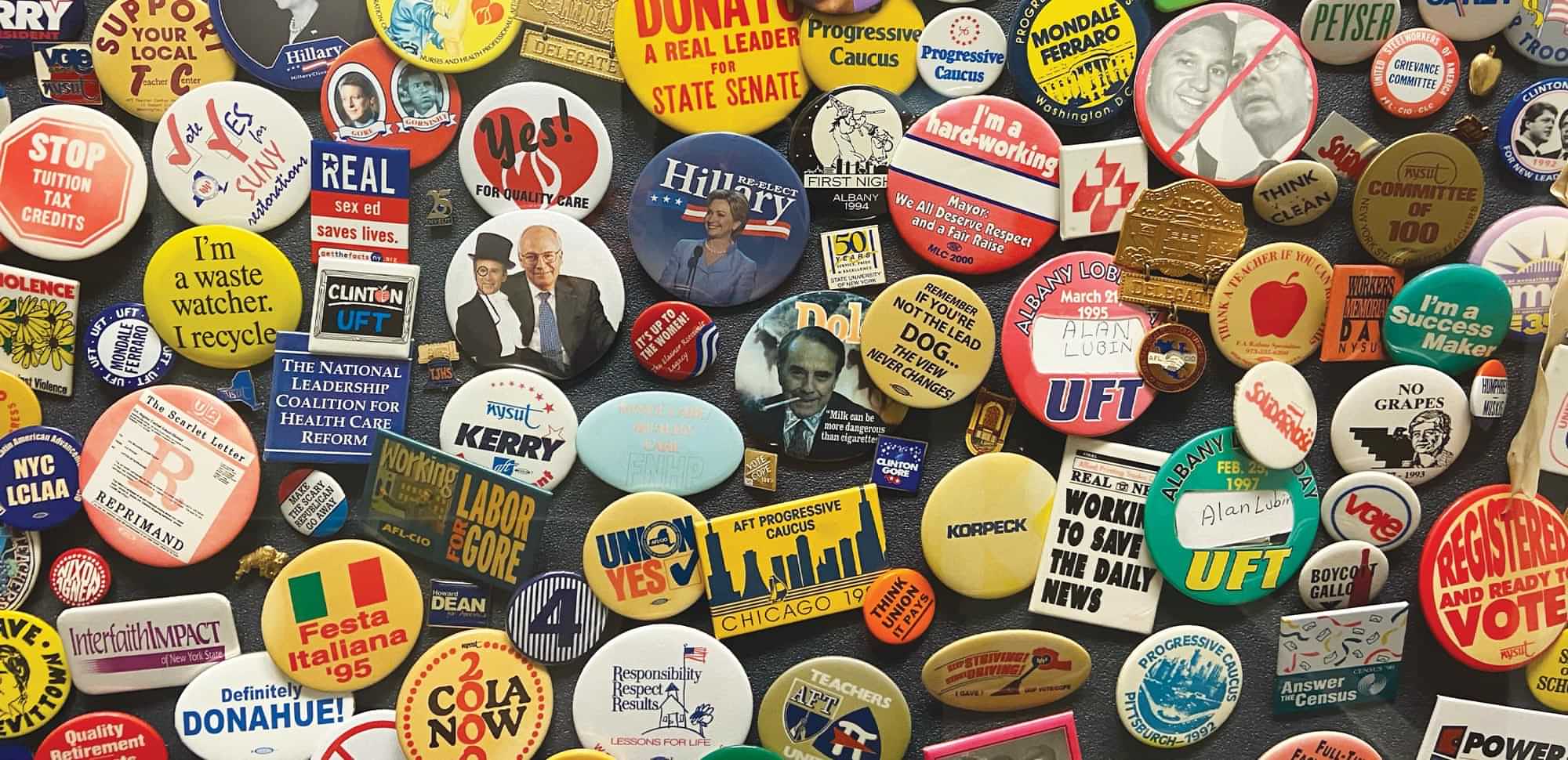
Union’s grassroots advocacy evolves, expands
The union’s nicknames, variously applied by politicians and the press, reflect a reputation built over decades of steady, savvy persistence in the public arena. Teachers went from being dissed and disregarded to defining the agenda in education and health care. “Who are the teachers supporting?” was a common inquiry from pro-education voters.
As NYSUT’s banner broadened to encompass a wide range of professions, the union became known as a model for grassroots effectiveness. NYSUT’s forward-thinking political strategy, honed over the last decade, focuses on empowering members, innovating tactics and building on our legacy.
Pipeline project prepares members to run for office
And they are winning.
In 2022 alone, 60 NYSUT members were elected to school boards, double the number five years before. Almost 300 pro-education candidates in multiple levels of government were elected statewide with NYSUT’s support. A common denominator: many were graduates of NYSUT’s Pipeline Project, an innovative training program for union and community members that prepares them to run for office at all levels.
“Under the banner ‘Public Schools Unite Us,’ we’ve seen a wave of pro-public education candidates elected,” said NYSUT’s Melinda Person, who initiated the Pipeline Project and other innovations to expand the reach of NYSUT’s political action arm. “We’re proud to see how many educators are stepping up to support candidates or to run for office themselves.”
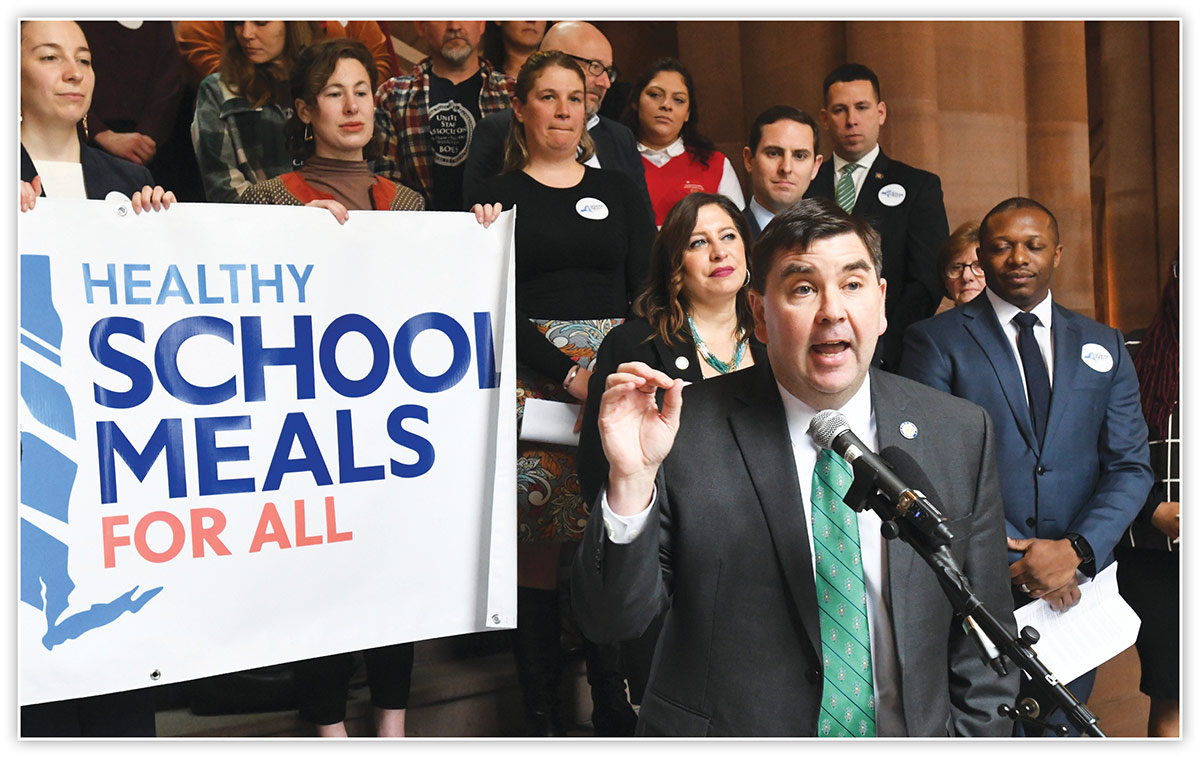
Launched in 2015, the Pipeline Project provides six weeks of training in everything from team building to developing a message to targeting voters to fundraising. NYSUT locals support members with endorsements and get-out-the-vote campaigns. “We tell our members: The world would be a better place if you ran for office,” said NYSUT President Andy Pallotta. “From your local school board to city hall to Albany and beyond, you can make a difference.”
To empower and assist locals in their political action, NYSUT established a network of Regional Political Organizers in 2015. Locals subsequently orchestrated many upset victories: winning special elections in long-shot races, flipping seats, overturning hostile school boards and passing ballot referendums. In 2021, for example, upstate primaries for mayor, county legislature and common council seats saw significant wins by NYSUT member and allied candidates.
Since 1997, the NYSUT Leadership Institute has empowered new and emerging union activists to assume greater leadership roles within their locals and the statewide union. In 2022, three dozen members completed the six-day training that included labor history, team building and national briefings from leaders of AFT and NEA. Fully two generations of leaders have put Leadership Institute principles to work in their communities.
The union’s Local Action Project, an innovation two decades ago that has since become an institution, is a summer session that empowers teams of activists from participating locals to engage their communities. It’s a three-year commitment, with NYSUT providing grants to support locals’ goals.
Innovating tactics
The statewide union can provide the number of NYSUT members in a legislative district, registered voter list, turnout data and even the ideological trends in the community.
Data is provided and analyzed by NYSUT’s own Benchmark Polling Group, a state-of-the-art in-house center founded in 2000 for polling and get-out-the-vote campaigns. Over the years, rotary phones, carbon-copied phone scripts and hand-written letters gave way to computer-automated phone banks that allow volunteers to reach voters more systematically than ever before. Activists can now make phone calls from the comfort of their homes.
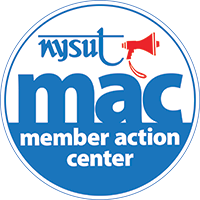
NYSUT never uses its calling centers for commercial purposes. Its data helps local activists determine which tactics — phone calls, mailers, signs, social media — will be most effective for specific campaigns.
NYSUT took the lead in 2012 to broaden advocacy tactics available to members by creating the online Member Action Center, enabling members to rapidly email multiple policy makers on issues of the day. A phone app was added shortly thereafter. Strategic use of social media further expanded reach.
In the early 2000s, NYSUT’s member publication, originally New York Teacher, was re-named NYSUT United to better reflect the variety of professions the union represents. A weekly Leader Briefing and other digital newsletters expanded outreach.
While digital communications are essential, members reflect fondly on some out-of-the-box tactics employed over the last decade to make a point: A circling billboard on a truck at the 2022 RA; a plane trailing an incisive message above a corporate education reform gathering; member debates with a cardboard cut-out of Gov. Andrew Cuomo; “Mr. Moneybags” popping out of a limo at the State Capitol.
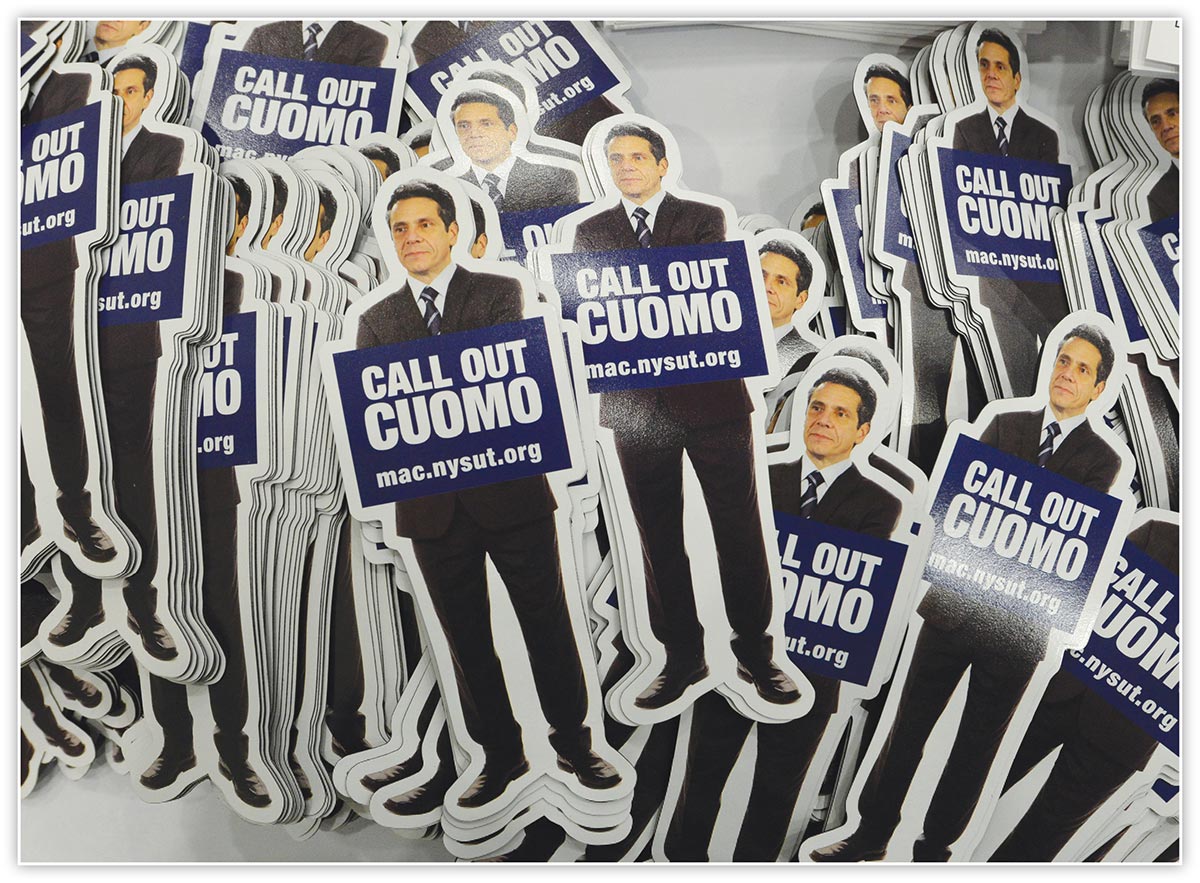
NYSUT advocacy materials are a hot ticket item. One of the most popular, appearing on doors, refrigerators and cars around the state are the “Call Out Cuomo” magnets.
Building on our legacy
NYSUT’s first formal Committee of 100, its grassroots lobbying group, was organized in 1973, with a name insufficient to its size. It started out 165 strong, a number that has swelled during crises to more than a thousand member activists who descend multiple times a year on the Capitol for lobbying. NYSUT also organizes specific lobby days targeted to retirees, higher education, teacher centers, BOCES and health care.
NYSUT provides expertise and support for the union’s vast network of activists. The union’s political arm is supported by a dedicated team of members serving as political action coordinators around the state.
Jefferson-Youngsville retiree Carol Slotkin was a rookie teacher in the 1970s when NYSUT’s advocacy reversed an onerous teacher probation law. “I began to realize the connection between what happens in Albany, Washington and the rest of the world,” Slotkin said. “I began to realize how politically active you had to be.”
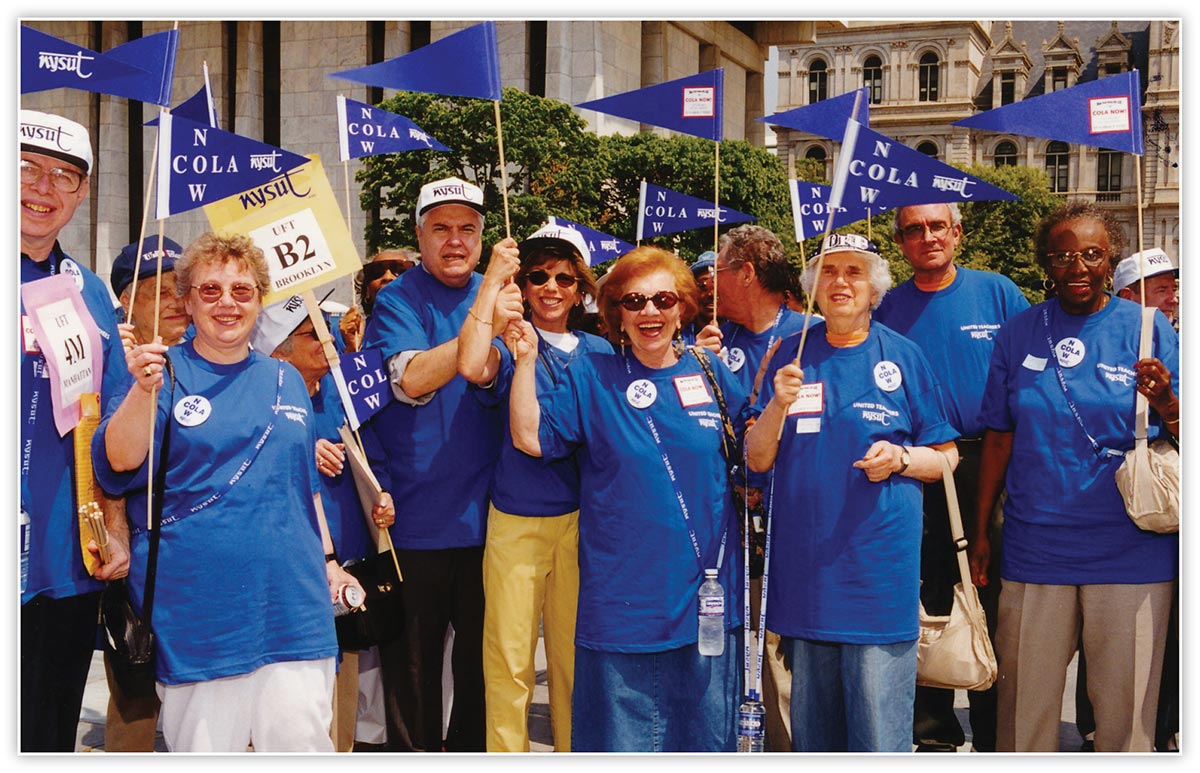
Surmounting difficulties
“Stand up, speak up,” Cheryl Rockhill, president of the Brushton Moira Support Staff Organization, told colleagues learning how to lobby at a NYSUT online Town Hall. “Our issues are so important, elected officials need to hear them.” For SRPs in 2021, those issues included workplace safety; hiring more school bus attendants; strengthening due process; and uniform protocols for toileting students. Committee of 100 agendas continually evolve and build out the union’s history of accomplishment.
Leader of the PACs
No dues dollars go to political candidates. VOTE-COPE relies on voluntary donations in support of its longstanding mission: to secure pro-education, pro-worker rights’ legislation. NYSUT also provides VOTE-COPE rebates to local unions for activities such as school board races and community campaigns.
Lynn Costello, an East Islip high school social studies teacher who became chair of NYSUT’s VOTE-COPE, said it took awhile to convince teachers it was important to have a political action fund. “Teachers believed they had no connection to politics,” Costello said. “As far as they were concerned, if you were nice to the principal and made him happy, that was all you had to do.”
That attitude changed, however, when the anti-teacher Jerabek bills passed. Union leaders, including Costello, urged educators to donate a day’s pay, roughly $50, to establish a political war chest.
Costello, in fact, motivated Long Island teachers to contribute by playing them the message that Jerabek had used on his office phone, talking with pride about his anti-teacher bills. In 1972, union activists contributed a stunning half a million dollars for the upcoming election — and part of that money was used to defeat Jerabek.
“That convinced a lot of people that it was a good thing to pay attention to who was elected,” said Costello, who chaired VOTE-COPE for 30 years. “It woke people up to the power of political action and the need to have a real war chest.”
Since then, NYSUT’s VOTE-COPE fund has increased virtually every year, helping the union get its message out and elect lawmakers who support public education and union-backed legislation.
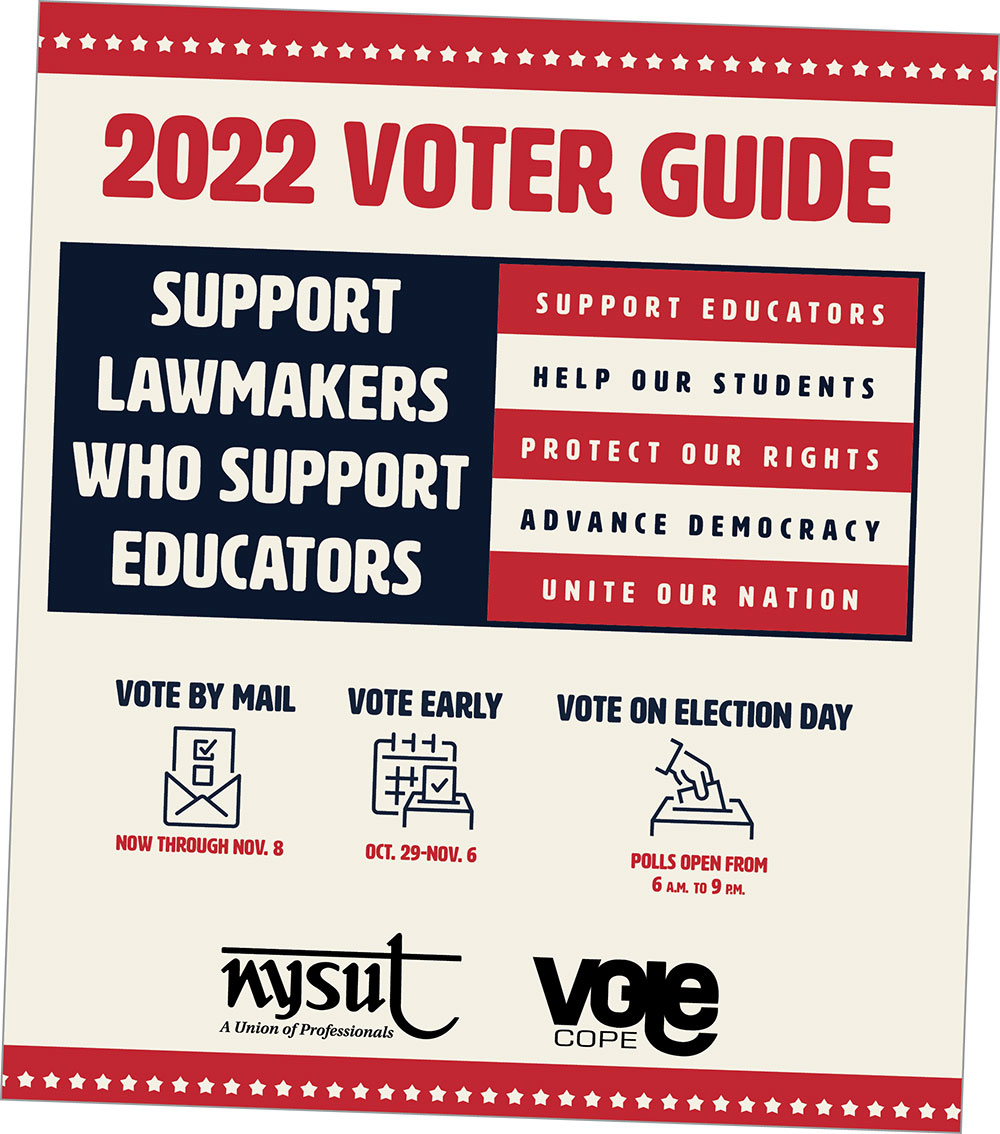
Going big for those we support
For its endorsed candidates in 2022, NYSUT members made 127,412 phone calls, sent out 338,904 texts and knocked on thousands of doors in concert with the AFL-CIO. The statewide union also sent out 236,087 mail pieces and delivered its stand-alone voter guide to almost 700,000 members’ homes.
The union’s political endorsements have always been bipartisan, tied to positions and not parties. Endorsed candidates are thoroughly vetted by NYSUT local presidents and by NYSUT’s Political Action Committee. The union’s Board of Directors gives final approval for candidates who believe in union values and the idea that public schools unite us.
One of the most valuable gifts of a union endorsement is NYSUT’s ability to deliver “feet on the street,” said Pallotta. “If we don’t get involved in that process, we lose our voice — and our power to protect those we serve.”
NYSUT never tells members how to vote, but provides information through its annual Voter Guide detailing candidates’ records on issues members deem important.
The union first tossed its hat into the political ring in 1974 when it endorsed Hugh Carey for governor. It was a gutsy move — Carey was a little-known New York City congressman — but he won endorsement based on his congressional voting record. Carey’s victory gave members a crash course in the value of unified political action and earned NYSUT a chunk of political clout that continued to grow.
NYSUT also has a significant voice in shaping national endorsements through its affiliates, the American Federation of Teachers, National Education Association and the AFL-CIO.
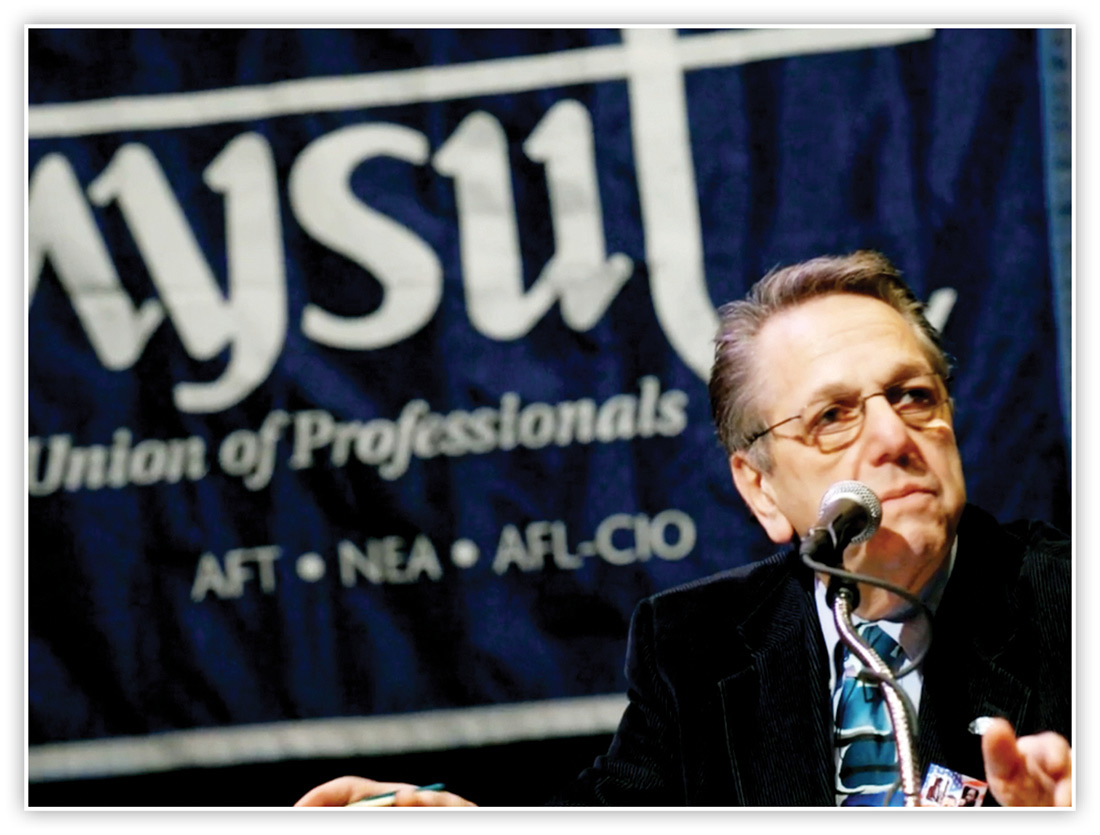
Get out the vote(s)
The average NYSUT member moves several times in the course of a lifetime. The union proactively provides voter registration materials to new members and those who relocate to ensure they retain their right to vote. Reflecting its bipartisan philosophy, NYSUT encourages members to register in a political party — it doesn’t matter which one. Being involved in primary campaigns is often as important as voting in general elections.
More than 1,600 volunteers helped get out the vote in May 2022, making more than 62,000 phone calls to their neighbors and knocking on 5,600 doors in support of school board candidates and budgets, achieving a budget approval rate of 99 percent.
“It’s the spirit and support from rank-and-file members that make NYSUT’s political action system work,” noted NYSUT Executive Vice President Emeritus Alan Lubin. As a UFT member, Lubin knew the New York City union had won improved conditions in the 1960s through strikes — but he never saw strikes as a realistic tool for long-term, significant change. “The only way to get real change was through political action,” Lubin said more than two decades ago. “We had to change the laws.”
His words were prophetic. As the “force to be reckoned with,” NYSUT’s legacy of positive change continues to grow.
Timeline
-
1977Spencer Van Etten TA in the Southern Tier becomes first “turnaround local” to rejoin NYSUT after choosing NEA-NY.
-
1977A 42-day strike in Lakeland is one of many statewide. Issues ranged from pay to dismissal procedures and class size protections. Eight teacher leaders are jailed. Taylor Law penalties keep teachers payless till February.
-
1978Committee of 100 braves 16 inches of snow to lobby for Taylor Law reform and state aid increases.
 1978Gov. Carey signs NYSUT bill repealing Taylor Law’s one-year probation penalty for public employees who strike.
1978Gov. Carey signs NYSUT bill repealing Taylor Law’s one-year probation penalty for public employees who strike.
-
1978Union holds first statewide SRP conference and first community college conference.
 1978American Federation of Teachers announces a campaign to organize health care workers. United University Professions wins election to represent 16,200 SUNY employees.1979Yonkers hires back laid-off teachers after a court orders reinstatement and back pay totaling $8.5 million.
1978American Federation of Teachers announces a campaign to organize health care workers. United University Professions wins election to represent 16,200 SUNY employees.1979Yonkers hires back laid-off teachers after a court orders reinstatement and back pay totaling $8.5 million.
 1979NYSUT forms the SRP Advisory Committee.
1979NYSUT forms the SRP Advisory Committee.
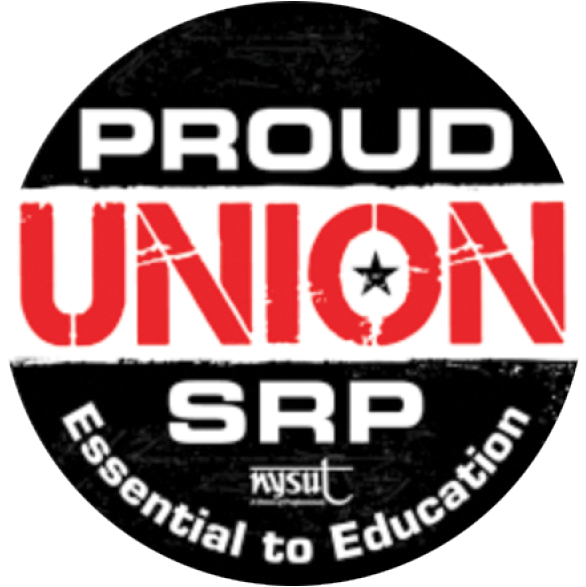
-
1979NYSUT affiliates its first health care locals under the Federation of Nurses and Health Professionals at St. John’s Episcopal Hospital (Long Island) and Arden Hill Hospital (Orange County).
-
1980U.S. Supreme Court’s “Yeshiva” ruling declares college faculty to be management employees, chilling organizing at private colleges.